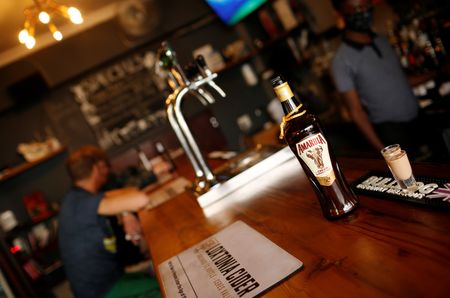JOHANNESBURG (Reuters) – Distell, set to be acquired by Dutch beverage company Heineken, said its half-year profit rose 17.5% on Thursday due to foreign currency gains even as the South African drinks maker continues to face the impact of the pandemic.
Distell, which makes wines, spirits and ciders, grew headline earnings per share (HEPS) – the main profit measure in South Africa – to 718.2 cents in the six months ended Dec. 31, compared with HEPS of 612 cents a year earlier.
Excluding the benefits from foreign currency movements, the company’s headline earnings rose 6%, driven by a 15.8% increase in revenue mostly from its home market South Africa, where pandemic-fuelled curbs on alcohol trading continued but eased from year-ago levels.
In other key markets such as Botswana, restrictions continued to bite, denting the performance of operations outside of South Africa.
“Revenue growth was achieved despite having to contend with managing the ongoing challenges associated with COVID-19 … rising commodity cost pressures, global supply chain disruptions, an increase in the cost imported goods and glass shortages in our domestic market,” Distell said.
Distell again held off on declaring a dividend under the terms of its transaction with Heineken, which announced in November its plans to take control – news that sent Distell shares down 7% on the day.
While the transaction garnered the required votes from shareholders earlier this month, not all are pleased with its terms, which will see Distell de-listed and shareholders able to cash out for around 180 rand per share or keep hold of some stock.
Asset manager Ninety One issued a statement saying it would vote against the deal because the price was too low and it did not offer shareholders the chance to remain invested in a listed entity.
(Reporting by Emma Rumney; Editing by Kim Coghill and Sherry Jacob-Phillips)









